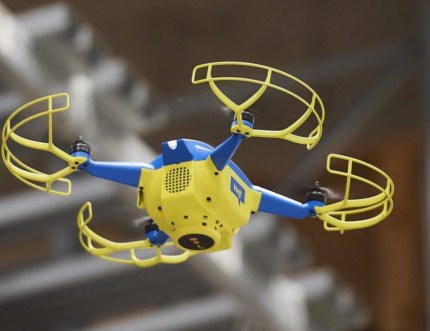Investors and entrepreneurs are beginning to bring new diagnostic tools to market that promise better results for cancer patients through the identification of mutations in cancer cells that can create more targeted therapies.
Earlier this month, research using technology developed by the startup Mission Bio helped identify cellular mutations in acute myeloid leukemia cancer cells that could be indicators of potential relapse or recurrence of the cancer after therapy.
In the study, which was presented at the American Society for Hematology’s recent conference, a team from the MD Anderson cancer research institute in Texas, including Dr. Koichi Takahashi, sequenced more than 500,000 cells across 70 patients using Mission Bio’s “Tapestri” platform.
“These results demonstrate the power of analyzing heterogeneity for the study and treatment of cancer patients,” said Dr. Takahashi, in a statement. “Tapestri’s ability to precisely identify cancer subclones throughout treatment and disease progression brings us closer to delivering on the promise of precision medicine.”
Increasingly, researchers are coming to the conclusion that genetic mutations of individual cancer cells can lead to the persistence of minimal residual disease and therapy resistance. Other leading cancer centers at universities, including the University of California, San Francisco, University of Pennsylvania and Stanford University, have also released papers on the viability of Mission Bio’s approach.
That research may help explain why Mission Bio was able to land $30 million in new funding from a slew of investors, including Agilent Technologies, Cota Capital, LabCorp, LAM Capital and Mayfield.
The company said it will use the cash to increase the work it’s doing in blood cancer research while expanding its business into the analysis of CRISPR applications and potential mutations that can occur through the use of that gene editing technology.
“Cancer will kill 10 million people this year alone. We can beat cancer with more effective, dynamic therapies, but we first need to precisely understand its biology, starting with the varying genetic composition of each and every cancerous cell,” explained Charlie Silver, CEO of Mission Bio. “Minimal residual disease is a major cause of cancer relapse; overlooking even one cell could put a life at risk. With the Tapestri Platform, we can track every cell, every mutation, to better guide treatments and save patient lives.”

That mutation tracking is also what brought Agilent on board as the company takes its initial steps into monitoring the intended and unintended consequences of using CRISPR technology to edit genes.
“The Tapestri platform’s unique quality control capabilities are strengthening our CRISPR R&D programs,” remarked Darlene Solomon, Senior Vice President and Chief Technology Officer of Agilent Technologies. “Agilent’s commitment to innovation and precision medicine are well matched with Mission Bio’s Tapestri platform as it has the potential to improve patient outcomes in the fight against cancer — and that’s the most meaningful benchmark of all.”
Mission Bio isn’t the only company making strides when it comes to cancer treatments and new targeted monitoring technologies.
Cambridge Cancer Genomics is another startup company working on bringing new technologies to blood sample analysis that can better identify cancer and target personalized therapies for the disease.
The company has raised $4.5 million to build what it’s calling one of the largest data sets of longitudinal cancer in the world.
Like Mission Bio, CCG is hoping that its data can help map the ways cancer cells evolve in response to treatments and suggest new therapies to doctors.
Financing the company’s rollout are investors including AME Cloud Ventures, Refactor Capital, Romulus Capital and Y Combinator. Additional capital has come from the company’s early partner, the Comprehensive Blood and Cancer Center in Bakersfield, Calif., which invested not only cash but provided 4,000 clinical samples for CCG to analyze and develop their monitoring and predictive solution.
Both companies are trying to tackle the “one-size-fits-all” approach to cancer therapy that exists for most patients around the world.
First line cancer treatment fails two-thirds of all patients and the realization that treatments aren’t working can take up to six months to recognize. Like Mission Bio, CCG is also working to identify whether a patient is at risk of relapse — something the company claims it can do 7 months earlier than standard practices.
“When you drill down into the DNA changes behind cancer, you quickly find that no two tumors are the same. To apply cancer therapies more successfully to any given tumor, we need a deeper understanding of what exactly has gone wrong in each case at a molecular level,” says Dr. Harry Clifford, a co-founder and chief technology officer at Cambridge Cancer Genomics. “This starts with effective tools to capture that information. The approaches we’re developing at CCG will have widespread applications, from identifying targets for new therapy development, to deciding which personalized approach is best for a given patient.”
That echoes the thinking of companies like Mission Bio, and like Mission Bio, CCG has published results from recent trials of its technology.
The company applied its predictive technology to the outcome of different therapies in over 2,500 breast cancer patients and used its machine learning technology to identify the same kind of variants that Mission Bio is working to call out in an attempt to understand when and how relapses can occur.
1) Interlacing Personal and Reference Genomes for Machine Learning Disease-Variant Detection
https://arxiv.org/abs/1811.
Summary: Differences in our DNA underlie many aspects of human health; from rare genetic diseases to cancer. In this paper, we build a new class of software for detecting DNA variants. Based on the same principles behind facial recognition, our technique can identify cancer variants with unparalleled accuracy. We hope that releasing this software for non-commercial use will lead to more successful targeted therapy and personalized cancer medicine.































Comment